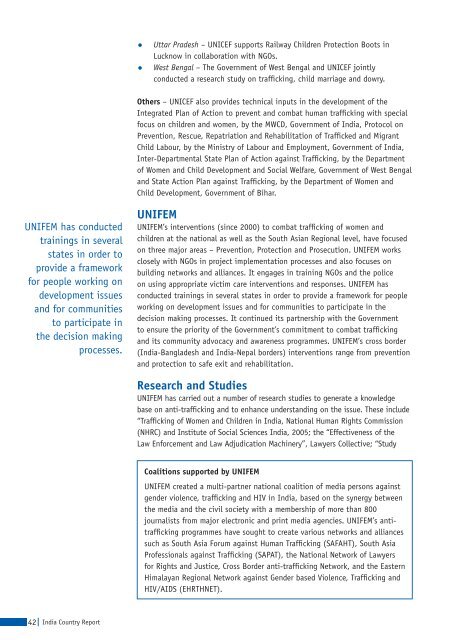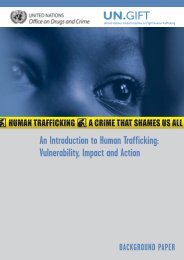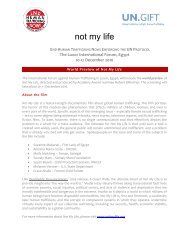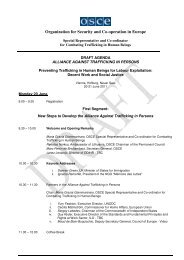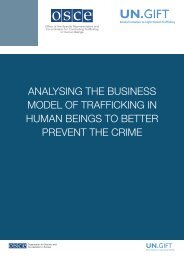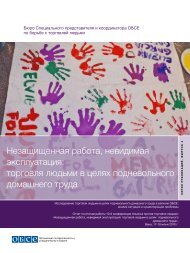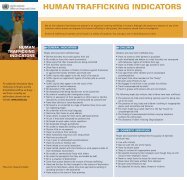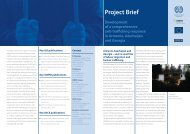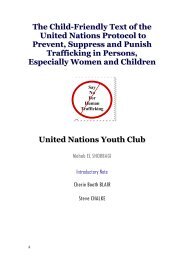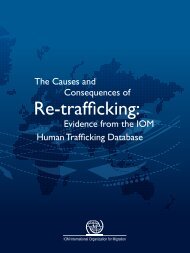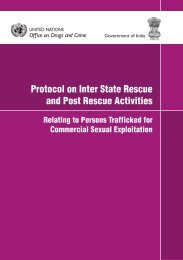India Country Report - United Nations Office on Drugs and Crime
India Country Report - United Nations Office on Drugs and Crime
India Country Report - United Nations Office on Drugs and Crime
You also want an ePaper? Increase the reach of your titles
YUMPU automatically turns print PDFs into web optimized ePapers that Google loves.
Uttar Pradesh – UNICEF supports Railway Children Protecti<strong>on</strong> Boots in<br />
Lucknow in collaborati<strong>on</strong> with NGOs.<br />
West Bengal – The Government of West Bengal <strong>and</strong> UNICEF jointly<br />
c<strong>on</strong>ducted a research study <strong>on</strong> trafficking, child marriage <strong>and</strong> dowry.<br />
Others – UNICEF also provides technical inputs in the development of the<br />
Integrated Plan of Acti<strong>on</strong> to prevent <strong>and</strong> combat human trafficking with special<br />
focus <strong>on</strong> children <strong>and</strong> women, by the MWCD, Government of <str<strong>on</strong>g>India</str<strong>on</strong>g>, Protocol <strong>on</strong><br />
Preventi<strong>on</strong>, Rescue, Repatriati<strong>on</strong> <strong>and</strong> Rehabilitati<strong>on</strong> of Trafficked <strong>and</strong> Migrant<br />
Child Labour, by the Ministry of Labour <strong>and</strong> Employment, Government of <str<strong>on</strong>g>India</str<strong>on</strong>g>,<br />
Inter-Departmental State Plan of Acti<strong>on</strong> against Trafficking, by the Department<br />
of Women <strong>and</strong> Child Development <strong>and</strong> Social Welfare, Government of West Bengal<br />
<strong>and</strong> State Acti<strong>on</strong> Plan against Trafficking, by the Department of Women <strong>and</strong><br />
Child Development, Government of Bihar.<br />
UNIFEM has c<strong>on</strong>ducted<br />
trainings in several<br />
states in order to<br />
provide a framework<br />
for people working <strong>on</strong><br />
development issues<br />
<strong>and</strong> for communities<br />
to participate in<br />
the decisi<strong>on</strong> making<br />
processes.<br />
UNIFEM<br />
UNIFEM’s interventi<strong>on</strong>s (since 2000) to combat trafficking of women <strong>and</strong><br />
children at the nati<strong>on</strong>al as well as the South Asian Regi<strong>on</strong>al level, have focused<br />
<strong>on</strong> three major areas – Preventi<strong>on</strong>, Protecti<strong>on</strong> <strong>and</strong> Prosecuti<strong>on</strong>. UNIFEM works<br />
closely with NGOs in project implementati<strong>on</strong> processes <strong>and</strong> also focuses <strong>on</strong><br />
building networks <strong>and</strong> alliances. It engages in training NGOs <strong>and</strong> the police<br />
<strong>on</strong> using appropriate victim care interventi<strong>on</strong>s <strong>and</strong> resp<strong>on</strong>ses. UNIFEM has<br />
c<strong>on</strong>ducted trainings in several states in order to provide a framework for people<br />
working <strong>on</strong> development issues <strong>and</strong> for communities to participate in the<br />
decisi<strong>on</strong> making processes. It c<strong>on</strong>tinued its partnership with the Government<br />
to ensure the priority of the Government’s commitment to combat trafficking<br />
<strong>and</strong> its community advocacy <strong>and</strong> awareness programmes. UNIFEM’s cross border<br />
(<str<strong>on</strong>g>India</str<strong>on</strong>g>-Bangladesh <strong>and</strong> <str<strong>on</strong>g>India</str<strong>on</strong>g>-Nepal borders) interventi<strong>on</strong>s range from preventi<strong>on</strong><br />
<strong>and</strong> protecti<strong>on</strong> to safe exit <strong>and</strong> rehabilitati<strong>on</strong>.<br />
Research <strong>and</strong> Studies<br />
UNIFEM has carried out a number of research studies to generate a knowledge<br />
base <strong>on</strong> anti-trafficking <strong>and</strong> to enhance underst<strong>and</strong>ing <strong>on</strong> the issue. These include<br />
“Trafficking of Women <strong>and</strong> Children in <str<strong>on</strong>g>India</str<strong>on</strong>g>, Nati<strong>on</strong>al Human Rights Commissi<strong>on</strong><br />
(NHRC) <strong>and</strong> Institute of Social Sciences <str<strong>on</strong>g>India</str<strong>on</strong>g>, 2005; the “Effectiveness of the<br />
Law Enforcement <strong>and</strong> Law Adjudicati<strong>on</strong> Machinery”, Lawyers Collective; “Study<br />
Coaliti<strong>on</strong>s supported by UNIFEM<br />
UNIFEM created a multi-partner nati<strong>on</strong>al coaliti<strong>on</strong> of media pers<strong>on</strong>s against<br />
gender violence, trafficking <strong>and</strong> HIV in <str<strong>on</strong>g>India</str<strong>on</strong>g>, based <strong>on</strong> the synergy between<br />
the media <strong>and</strong> the civil society with a membership of more than 800<br />
journalists from major electr<strong>on</strong>ic <strong>and</strong> print media agencies. UNIFEM’s antitrafficking<br />
programmes have sought to create various networks <strong>and</strong> alliances<br />
such as South Asia Forum against Human Trafficking (SAFAHT), South Asia<br />
Professi<strong>on</strong>als against Trafficking (SAPAT), the Nati<strong>on</strong>al Network of Lawyers<br />
for Rights <strong>and</strong> Justice, Cross Border anti-trafficking Network, <strong>and</strong> the Eastern<br />
Himalayan Regi<strong>on</strong>al Network against Gender based Violence, Trafficking <strong>and</strong><br />
HIV/AIDS (EHRTHNET).<br />
42 <str<strong>on</strong>g>India</str<strong>on</strong>g> <str<strong>on</strong>g>Country</str<strong>on</strong>g> <str<strong>on</strong>g>Report</str<strong>on</strong>g>


